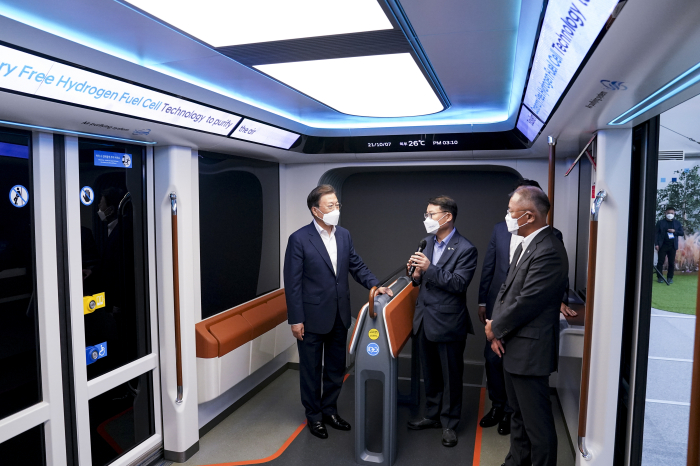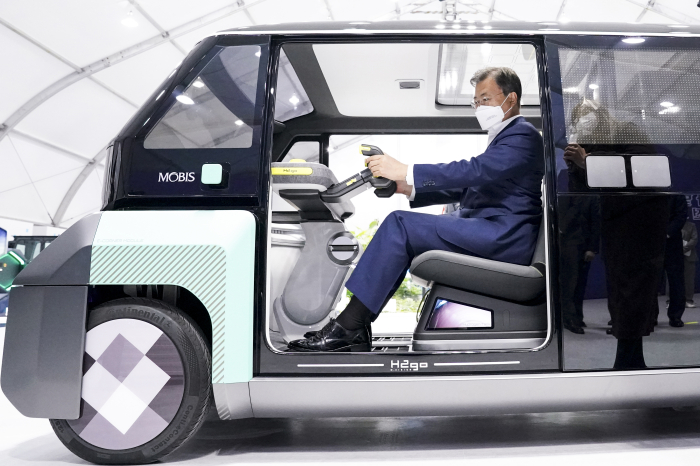S.Korea sees tenfold rise in hydrogen fuel use by 2030
The government vows all-around support to boost hydrogen consumption to 3.9 million tons by 2030 vs 2021 level
By Oct 07, 2021 (Gmt+09:00)
LG Chem to sell water filter business to Glenwood PE for $692 million


Kyobo Life poised to buy Japan’s SBI Group-owned savings bank


KT&G eyes overseas M&A after rejecting activist fund's offer


StockX in merger talks with Naver’s online reseller Kream


Mirae Asset to be named Korea Post’s core real estate fund operator



South Korea will sharply increase the adoption of hydrogen as a fuel of transportation, industrial plants and power generators to become the world's leading hydrogen economy, President Moon Jae-in said on Thursday.
The government will provide all-around support, including debt payment guarantees and tax deductions, to hydrogen-related companies and their overseas hydrogen projects with an aim to create 30 leading hydrogen companies by 2030. By then, the government plans to boost domestic hydrogen consumption over tenfold to 3.9 million tons from this year's estimated 220,000 tons, according to Minister of Trade, Industry and Energy Moon Sung-wook.
The minister unveiled the plan, entitled "The benefit of the hydrogen economy and the government's vision as a leading hydrogen economy," in a briefing to President Moon and the country's leading business leaders on the sidelines of the groundbreaking ceremony for Hyundai Mobis' hydrogen fuel cell plants in Incheon, west of Seoul.
During the event, President Moon said the government will push forward the plan to make clean hydrogen the country's future growth driver.
"The government and companies are now one team working toward the goal of becoming a leading hydrogen economy," he said in a meeting with CEOs of the country's leading business groups ahead of the groundbreaking ceremony. "The government will be at the forefront of the efforts, cheering and supporting the companies' endeavors."
The 2030 consumption target of hydrogen is twice as much as the government's previously stated number of 1.94 million tons by 2030, disclosed in January 2019 as part of its road map toward a hydrogen economy.
By 2050, South Korea plans to increase domestic hydrogen consumption over tenfold to 27 million tons, compared to 2030. Clean hydrogen, which emits zero carbon dioxide (CO2) during the production process, will account for half of the country's hydrogen consumption by 2030 and then 100% by 2050, by when the country aims to achieve carbon neutrality.
Currently, hydrogen fuel used to power plants is mostly grey hydrogen, which is produced from fossil fuels. In comparison, blue hydrogen is produced from natural gas and emits less CO2, while green hydrogen is the cleanest variety as it uses renewable energy to produce hydrogen from water.

30 GLOBAL HYDROGEN COMPANIES
To create 30 South Korea-based global hydrogen companies by 2030, all government ministries will pull together to expand tax deductions and financing support, including debt payment guarantees, to the companies that develop hydrogen technologies and carry out relevant projects.
As part of the efforts, they will help establish hydrogen education centers in colleges and graduate schools, which will likely lead to the creation of 50,000 jobs.
In the automobile industry, South Korea will sharpen hydrogen fuel cell technology to widen the gap with its global competitors. It also plans to expand the use of hydrogen as a fuel for trains, ships and urban air mobility services.
HYDROGEN INFRASTRUCTURE
Moreover, the government will bring forward the commercialization of vessels carrying ammonia and liquefied hydrogen, as well as building ports used for hydrogen transportation. Ammonia is currently considered the most efficient hydrogen storage and transportation medium because of its low explosion risk compared to hydrogen.
Major South Korean companies' hydrogen production plans
| Company | Plans | Details |
| Samsung Engineering, Lotte Chemical, POSCO | Sarawak hydrogen project in Malaysia | To produce blue and green hydrogen and ammonia for industrial use |
| GS Energy and six other Korean companies | To import 1.14 million tons of blue ammonia from the United Arab Emirates | In partnership with Abu Dhabi National Oil Company |
| SK Group | To invest 18.5 trillion won in building hydrogen ecosystem | To develop the technology of producing, liquefying and transporting 250,000 tons of blue hydrogen a year |
| KEPCO | To replace seven coal-powered plants with ammonia-fueled plants by 2050 | |
"If governments around the world increase the adoption of hydrogen fuel, hydrogen will likely account for 24% of global energy consumption by 2050," said an industry source. "We can't give up a market worth $700 billion."
Write to Don-won Lim and Ji-hoon Lee at van7691@hankyung.com
Yeonhee Kim edited this article.
-
 Hydrogen economyHyundai Mobis breaks ground on $1.1 bn hydrogen fuel cell plants
Hydrogen economyHyundai Mobis breaks ground on $1.1 bn hydrogen fuel cell plantsOct 07, 2021 (Gmt+09:00)
2 Min read


